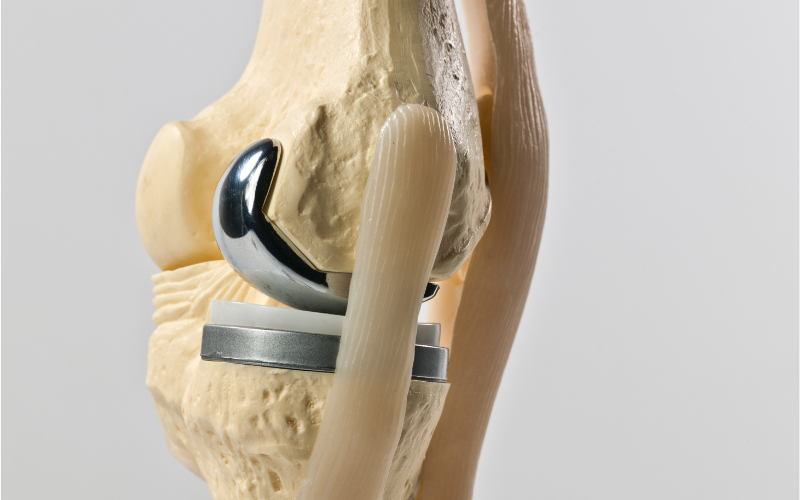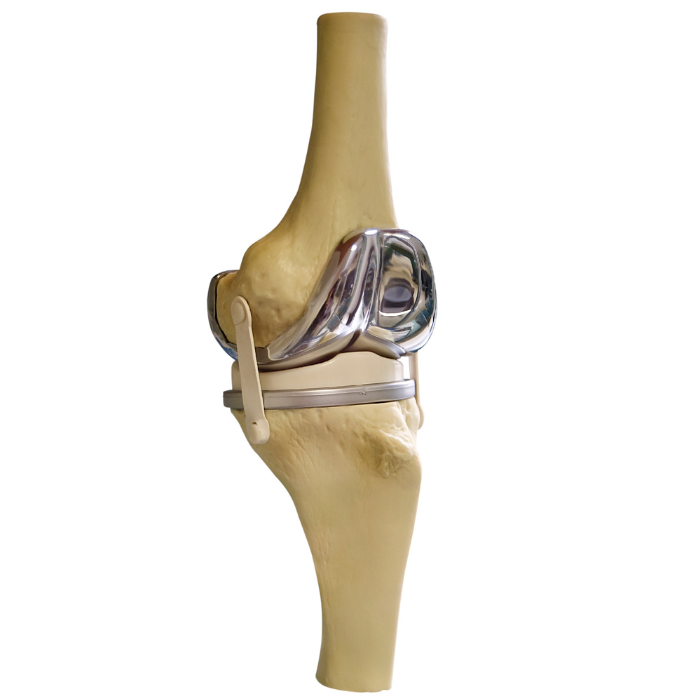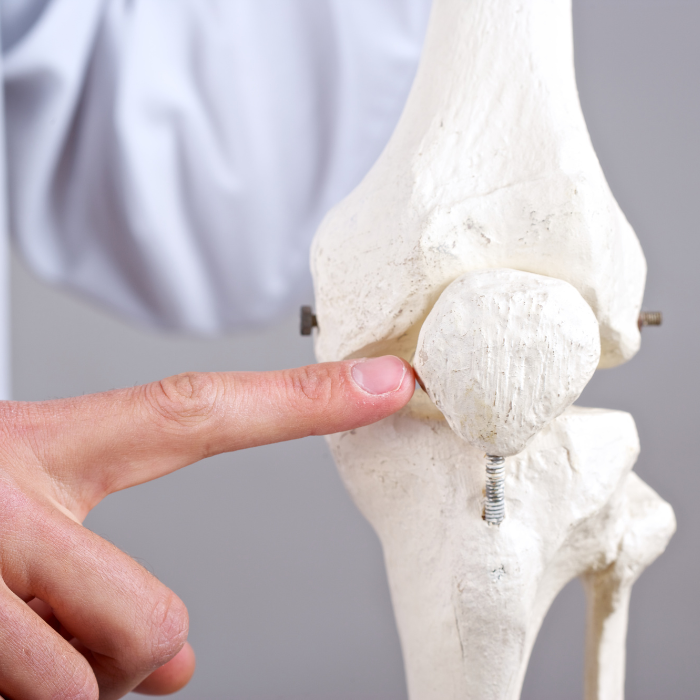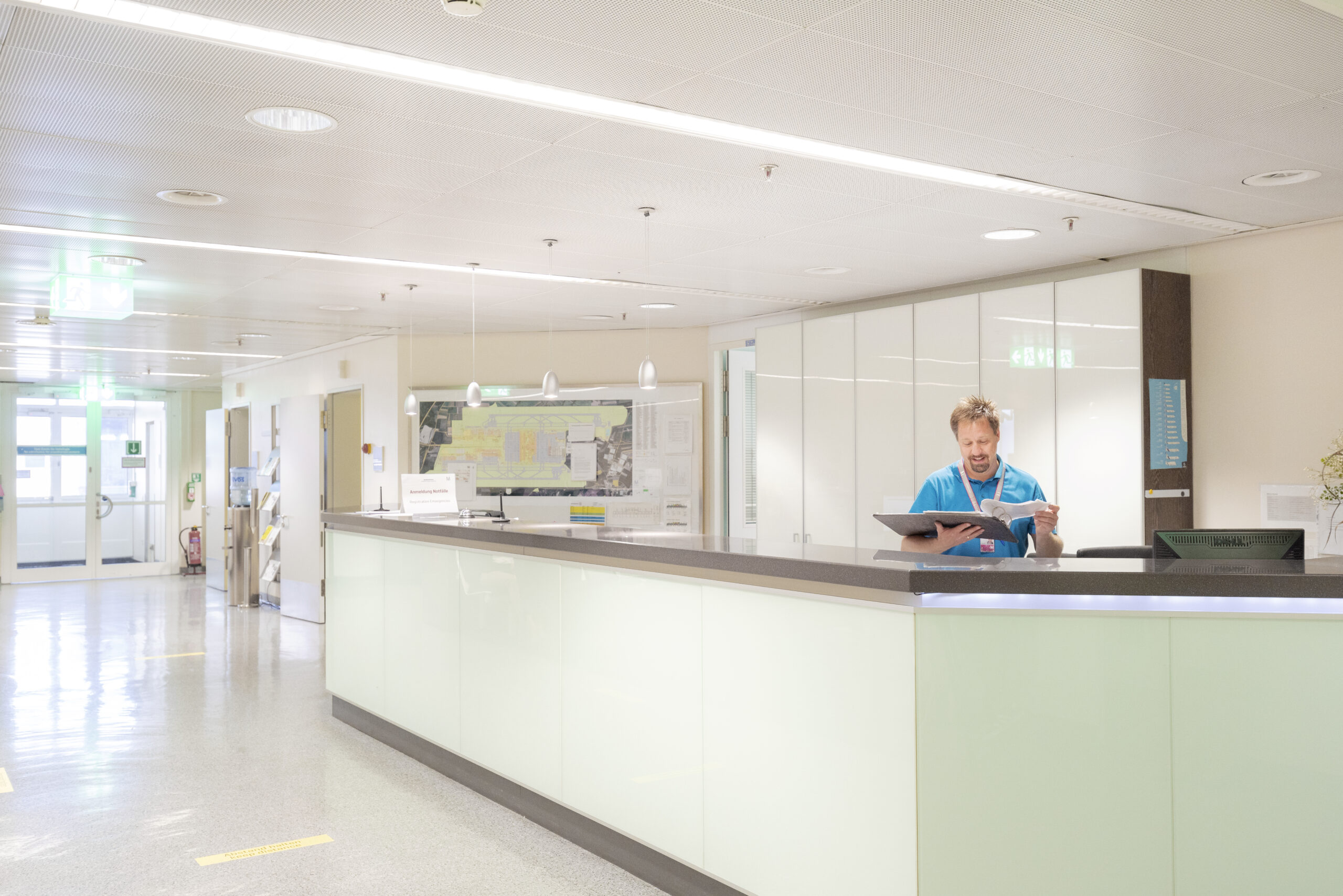Knee Replacement
Surgery in Germany
All-inclusive packages from €10,000 – 12,000 • German Excellence: World-class orthopedic care
Knee pain and limited mobility can significantly impact your quality of life. When conservative treatments are no longer effective, a knee prosthesis may be the best solution. This procedure involves resurfacing the knee joint with an artificial implant. At Munich Airport Clinic in Germany we offer state-of-the-art operating rooms and a cutting-edge medical infrastructure for knee surgeries. Our experienced knee specialists in Munich perform minimally invasive procedures and select the most suitable knee surface prosthesis tailored to your individual needs.
When Is a Knee Replacement Surgery Necessary?
A knee resurfacing prosthesis is recommended when the joint is severely damaged, and pain and restricted movement significantly impact daily life. Common causes include:
If daily activities like climbing stairs or low-impact sports become too painful, a knee prosthesis can restore mobility and significantly improve quality of life.
Good to know: At our clinic at Munich Airport, we welcome both private and publicly insured patients at any time.
Why choose Germany for a Knee Replacement Surgery?
Patients from Canada and the UK often face prolonged waiting times for knee replacement surgeries. In Canada, the benchmark is to perform these surgeries within 26 weeks (approximately 6 months), yet many wait longer. In the UK, the NHS aims for treatment within 18 weeks of referral—but only 56.6 % meet this goal, and some endure delays of over a year.
Germany’s advanced healthcare system delivers a very different experience. At Munich Airport Clinic, self-pay patients typically receive surgery within 3–4 weeks, paired with world-class orthopedic expertise and fully personalized care plans.
Even if you bypass public waitlists by opting for a private UK clinic, you’ll pay significantly more. Private London providers charge £13,000–18,000 (≈ €15,000–21,000), whereas our all-inclusive packages start at €10,000–12,000— which makes us about 30-40% more affordable.
By choosing Munich Airport Clinic for your knee replacement surgery, you benefit from rapid access, exceptional German surgical quality, and substantial cost savings all in one seamless package.
COSTS
Costs for a knee replacement surgery in Germany
In Germany, at Munich Airport Clinic, our prices range between €10,000–12,000, which covers everything from the surgical fee and high-quality implant through to hospital accommodation, post-op physiotherapy planning, and structured follow-up—both in-clinic and via video consultations once you return home. These costs provide up to 40 % savings compared with typical private clinic fees of £13,000–18,000 in the UK (approximately €15,000–21,000).
WHICH PROSTHESES DO WE USE?
Types of Knee Prostheses
At Munich Airport Clinic, we offer various types of knee prostheses, individually tailored to your needs. Our experienced knee specialists will provide a detailed consultation to determine the most suitable prosthesis for your specific condition:
INTERNATIONAL SUPPORT
Process of Knee Replacement Surgery in Germany for International Patients
At our clinic, we understand the unique needs of international patients and strive to make the entire process as clear and seamless as possible. From the very first online consultation to post-surgery follow-up care, we ensure that each step is tailored to provide convenience, efficiency, and transparency. Our goal is to take the complexity out of medical travel, offering you all the support you need.
STEP BY STEP
Total Knee Replacement Surgery in Munich
The decision to implant an artificial knee joint primarily depends on the degree of joint damage and the patient’s symptoms. Imaging techniques, such as MRI or X-rays, help determine the extent of cartilage deterioration in the knee and whether a knee prosthesis is necessary.
INTERNATIONAL AND ENGLISH SPEAKING PATIENTS
Benefits at Munich Airport Clinic for International Patients

English-Speaking Staff

Expert Medical Professionals

Short Waiting Times

Lower cost

Proximity to Munich Airport

Highest Quality Medical Care
Benefits for expats in Germany – English-speaking patients in Germany
Enjoy truly seamless care with no language barriers—but always full access to our English-speaking medical and support teams. As a state-of-the-art clinic with an international focus, we combine German surgical excellence with personalized service. Located directly at Munich Airport, we eliminate city-centre traffic: simply take a short domestic flight from Hamburg, Berlin or elsewhere in Germany, arrive relaxed, undergo your procedure in a modern setting, and return home easily—all without long drives or communication gaps.
OUR EXPERTISE
Specialists for Knee Prosthesis Surgery in Munich
Munich Airport Clinic offers optimal conditions for knee surgeries. The implantation of a knee prosthesis is performed by our highly experienced specialists. Thanks to modern surgical techniques and precise diagnostics, patients benefit from the best possible treatment outcomes.

Prof. Dr. med. Armin Keshmiri
Chief Physician of Orthopaedic Department
Specialist in Orthopedics and Trauma Surgery
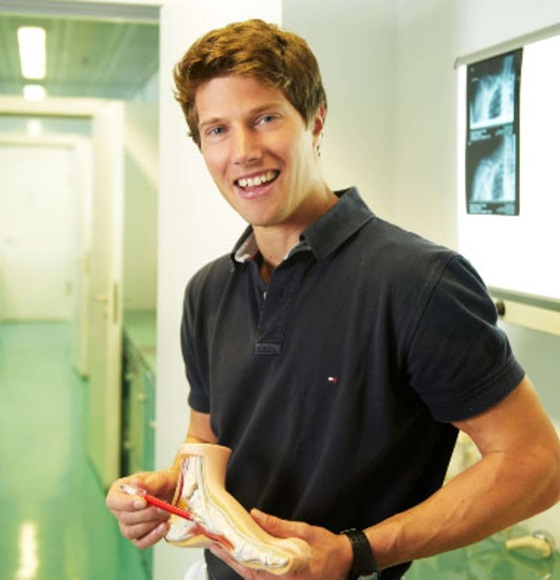
Dr. med. Ulli Kinkelin
Specialist in Orthopedics

Dr. med. Rüdiger Neitzel
Specialist in Orthopedics

Prof. Dr. med. habil Jens Schaumburger
Specialist in Orthopedics
AFTER THE SURGERY
In-Clinic Recovery After Your Knee Replacement Surgery
Recovery after knee prosthesis surgery requires active participation and patience. The goal is for patients to return to their daily activities pain-free. Mobilization begins shortly after surgery to ensure a smooth rehabilitation process.
Immediately After Surgery
During Your Hospital Stay
After Discharge
Please note that the healing process varies for each individual. Patience and consistent effort are key to a successful rehabilitation.
BACK HOME – WHAT COMES NEXT?
Ongoing Support for International Patients
After your knee prosthesis surgery in Germany, we understand that your main concern may be what happens once you’re back home in places like London, Dublin, or Toronto. Rest assured, our commitment to your care doesn’t end when you leave Munich. We provide ongoing support to ensure you continue to recover safely and effectively, no matter where you are.
Comparison of Prosthesis Types for the Knee Joint Replacement
| Category | Partial Prosthesis (Unicompartmental Knee Replacement) | Total Prosthesis (Total Knee Replacement, TKR) | Patellar Replacement (Kneecap Replacement) |
|---|---|---|---|
| Application Area | Only one side of the joint is affected | Both sides of the joint are severely damaged | Isolated damage to the kneecap |
| Durability | 20 years | 20 years | Depends on combination with other prostheses |
| Surgery Duration | Approx. 60 minutes | 60 minutes | 30 minutes |
| Return to Everyday Life | After approx. 6 weeks | Daily activities after 6 weeks, full load-bearing after 3 months | Varies individually |
| Recommended Age Groups | Patients between 50 and 70 years | Suitable for patients around 60 years and older | No specific age limit |
| Material | Metal alloys & polyethylene | Titanium, cobalt-chrome & polyethylene | Ceramic or plastic gliding surface |
FAQ
Frequently Asked Questions
About Knee Prosthesis
The actual surgery takes approximately 1 hour.
Our all-inclusive knee replacement packages start at €10,000–12,000, covering surgery, implant, hospital stay, rehabilitation planning, and follow-up. By comparison, private clinics in London typically charge £13,000–18,000 (≈ €15,000–21,000), making our offering up to 40 % more affordable.
Pain is normal in the first few weeks and gradually decreases as healing progresses. We will prescribe adequate pain medication to manage discomfort.
Typically, a knee prosthesis lasts around 20 years, depending on activity level and load.
Yes! However, high-impact activities like jogging should be avoided.
Climbing stairs with an artificial knee joint can be challenging at first. However, most patients are able to climb stairs with support by the time they leave the clinic.
Germany offers several advantages for knee replacement surgery:
- Shorter waiting times compared to the UK’s NHS.
- Cost-effective with high-quality care.
- Advanced medical technology and experienced surgeons.
- Minimally invasive techniques for quicker recovery.
- Comprehensive aftercare and rehab programs.
- Specialized services for international patients, including language support and travel assistance.
Germany provides fast, affordable, and high-quality knee replacement surgery, making it a top choice for patients seeking timely treatment.

